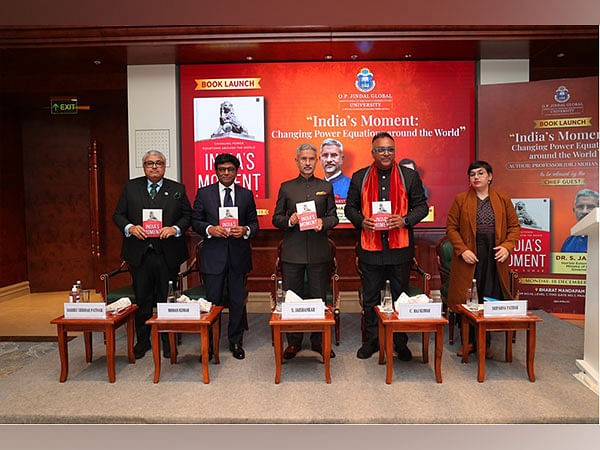External Affairs Minister S. Jaishankar launches Professor Mohan Kumar’s book
04/01/2024 2024-01-04 15:53External Affairs Minister S. Jaishankar launches Professor Mohan Kumar’s book
Inside JGU
December 2023
- External Affairs Minister S. Jaishankar launches Professor Mohan Kumar’s book
- JGU, University of Delhi join hands to host 74th annual All India Commerce Conference
- OEFL organises 9th JGU International Literary Conference
- JIBS conducts internship and training programmes
- CLIP conducts Teaching and Learning Faculty Workshop
- Right to Health Workshop for Northern Region
- JSPH faculty member publishes book
- IIHEd faculty member receives University of Melbourne award
External Affairs Minister S. Jaishankar launches Professor Mohan Kumar’s book

External Affairs Minister of India S. Jaishankar launched the book India’s Moment: Changing Power Equations around the World by Prof. Mohan Kumar, Dean, Strategic & International Initiatives, at O. P. Jindal Global University (JGU) and former Indian diplomat, at an event in New Delhi in December. The book is published by Harper Collins.
Speaking on the occasion, the minister remarked, “After 75 years of independence it is important to introspect more about foreign policy, because often we tend to think that the decisions which were taken were the only decisions that could have been taken, which may not be entirely true. So I think this exercise of the roads not taken, then they need not be hypothetical. I think it’s important to look back, keep refreshing, correcting ourselves… To get foreign policy right it’s important to look back, keep looking back, keep refreshing and keep correcting ourselves.”
He said, “In the context of foreign policy we’re all negotiators. Certainly when it comes to diplomacy. Today as we are looking at technology issues or security issues, or debating strategic autonomy there are the six factors that Dr. Mohan Kumar has referred to as the integrated framework in his book and the six factors, the first of which he calls the Gandhi litmus test, the poverty veto. The second is a policy space and the others include domestic politics, geopolitical imperatives, multilateralism and finally material gain because at the end of the day it is for common good. As India approaches a US$3 trillion economy, given the range of our interests, the extent of our development, perhaps we could consider two other factors as well in making decisions. One is really comprehensive national power because it’s not always what you are defending. It is also what you are acquiring. The second is that as we grow, particularly in the economic domain, I think it is becoming more and more important to insist as part of any understanding how much of it will lead to it being made in India and employed in India. If I were to look ahead at the Amrit Kal and the journey towards Viksit Bharat, I would certainly argue today that if I were to make a judgement, I would certainly look at decisions that would add or subtract from comprehensive national power and in ways it really contributes to creating deep strengths within India.”
Prof. (Dr.) C. Raj Kumar, Founding Vice Chancellor of JGU, elucidated on the growth of JGU as India’s leading university which began in 2009 and has emerged as an Institute of Eminence within 15 years of its existence. “Today, JGU has more than 10,000 students with nearly 1000 faculty member across 12 schools. JGU too has been part of India’s growth as we have achieved new heights in higher education. We focus on more than 400 international collaborations which allow for globalisation for our students and research collaborations for our faculty. Interdisciplinarity is a cornerstone of JGU policy which has also being outlined very strongly in the National Education Policy (NEP) 2020. We recognise that the boundaries of knowledge and barriers between disciplines need to be broke. Going forward we aim to become a comprehensive university working in the space of STEM and medical studies offering a range of qualifications for the growing demand of quality education in India.”
Reflecting on the book, the author Prof. Mohan Kumar said, “I have designed an integrated framework for understanding and assessment of India’s actions in the international arena. This framework comprises first and foremost the Gandhi litmus test, or what I have termed as the poverty veto. There are a huge number of people living in poverty in India and this has an impact on how India conducts international negotiations. Similarly, realpolitik and domestic politics also play a part. India is well on its way to become a leading power but in order to achieve that, the most important prerequisite is to reduce the number of people living in poverty and make growth inclusive. The important conclusion is that India must become a USD 10 trillion economy with inclusive growth. It will then be India’s moment — to transition from a balancing power to a leading power in the world.”
High Commissioner of India to UK Vikram Doraiswami launches book in London
High Commissioner of India to the United Kingdom Vikram K. Doraiswami launched the book by Professor (Dr.) Mohan Kumar in November in London. The Guest of Honour on the occasion was the Lord Patel of Bradford OBE, Member of the House of Lords, United Kingdom, Chairman, India Business Group; and Professor (Dr.) Mark E. Smith, President & Vice Chancellor University of Southampton. The institutional partner was The India Centre for Inclusive Growth and Sustainable Development, University of Southampton, represented by its Director, Professor Sabu Padmadas.
The idea of how India negotiates with the world is at the heart of the book. Career diplomat Mohan Kumar represented India at multiple international fora over a career spanning three and a half decades. During this time, he would invariably be told that Indian negotiators were among the best in the business. And yet, several of his interlocutors would ask, in the same breath, why India was such a tough customer when it came to international negotiations. This book is an attempt to set the record straight. At one level, India is not very different from other countries insomuch as it seeks to protect where necessary, and advance where possible, its national interest. There are several unique aspects about India and the way it approaches international negotiations. The book dwells on some of those fundamental factors and traces how India’s positions in international negotiations have evolved over time.
Mr Doraiswami said, “The context of India’s story is that at the time of India’s independence, 90% of our population lived below the poverty line and only 16% had access to education. No democracy in the world, including the West, has survived in less propitious conditions, starting with such an unequal society. From there, to now no system would have been able to reach this level of development. Our challenge has been to leverage international partnerships for growth but at the same time to preserve the complexities of dealing with the country. As Prof. Mohan Kumar suggested we need to take decisions on a non-ideological and pluralistic basis which support the national interest of India.”
Speaking on the occasion, Professor (Dr.) C. Raj Kumar said, “The next century will define India’s role in the world. Dr. Mohan Kumar is a distinguished diplomat and scholar who has bridged the gap between theory and practice and I congratulate him on his new book. He has incisively evaluated India’s leadership in key areas of international relations. A central contention of this book is that India has moved, slowly but surely, from being an alleged naysayer to becoming a putative partner for the world in key multilateral negotiations. More broadly, this reflects India’s growing political, economic and strategic clout in the world today. It is only when this transformation is fuller and more substantial that India will be able to fulfil its manifest destiny of becoming a leading power, capable of shaping global rules.”
Professor (Dr.) Mohan Kumar said, “It is a great honour that the book is being launched in the presence of such luminaries. It was my experience in Geneva at the WTO, which is the arena of some of the toughest negotiations in the world, that led me to write this book. It is about explaining India’s position and for this purpose I have crafted an integrated framework for assessment of India’s actions in the international arena. This framework, which is borne out of my experience, comprises first and foremost the Gandhi litmus test, or what I have termed as the poverty veto. There are a huge number of people living in poverty in India and this has an impact on how India conducts international negotiations. Similarly, realpolitik and domestic politics also play a part. It is the poverty veto which made India object to IPRs in the WTO, to the complete phase-out of coal in climate change negotiations and which made India buy Russian oil. India is well on its way to become a leading power but in order to achieve that, the most important prerequisite is to reduce the number of people living in poverty and make growth inclusive. In terms of geopolitical imperatives, today the power differential with China is big so that we are now required to be closer to the West, especially the United States. This is what IR scholars call external balancing which India achieves through these strategic partnerships. The important conclusion is that India must become a $10 trillion economy with inclusive growth. It will then be India’s moment: to transition from a balancing power to a leading power in the world.”
The Lord Patel of Bradford OBE, in his address as the Guest of Honour, said, “The role higher education plays in the relationship between India and the UK is crucial. It is now widely accepted that India’s position on the world stage is becoming increasingly impactful in influencing nations across the globe. India offers enormous opportunities. With its space programme, India is making significant contributions to the world’s scientific knowledge, technological innovation and space discoveries. During the pandemic, India became the pharmacy to the world. India puts the Global South at the centre of the global development agenda. For growth we need higher education, international collaborations like the one between JGU and Southampton University and skill-based education. Southampton University has an India research centre and we need to consolidate the India-UK relationship in education.”
Professor (Dr.) Mark E. Smith, in his concluding remarks, said, “JGU has world -class infrastructure and is rapidly developing its reputation as being one of the institutes of excellence. But more importantly, we value our link with India. India clearly has been a major power, but that power is clearly on a rapidly ascending trajectory. We as a leading education institute believe that India is the place to be both in partnership and more importantly, we look forward to developing our strategy and partnerships with a whole range of institutions within such an important country.”
